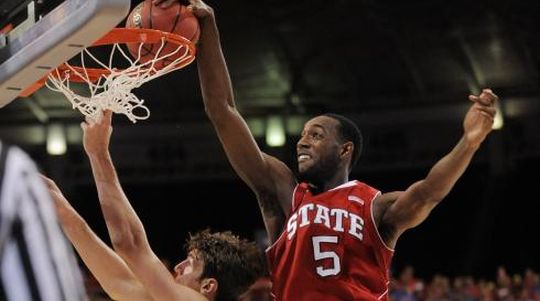What Happened to C.J. Leslie?
Posted by KCarpenter on February 27th, 2013Before the season started, North Carolina State’s C.J. Leslie was picked as the probable conference Player of the Year while leading his team to a predicted first place finish in the Atlantic Coast Conference. The Wolfpack currently sits at fifth in the conference standings and Leslie seems like he is now well outside of the all-ACC First Team, much less anywhere near the Player of the Year Award. He’s likely not even a serious contender for the best player on his team, let alone the conference. What happened to the Wolfpack star and how did he manage to fall so short of expectations this season?

Has C.J. Leslie underachieved this season? Or is he just a product of inflated expectations? (USA Today)
The answer, like the question, is two part. First, nothing happened to Leslie: He is fairly close to the same player he has always been. This season, the ultra-athletic forward is averaging 15.4 PPG and 7.6 RPG, marginal improvements over last year’s marks of 14.7 PPG and 7.3 RPG. In terms of tempo-free measures, Leslie has been a bit better at shooting, slightly worse at offensive rebounding, and a good bit worse in terms of turnovers while using about the same number of possessions as last year. The net result? An offensive efficiency of 100.1 this year as opposed to a mark of 102.1 last year. Outside of a little variation, Leslie has been what he was last year — a nearly average offensive player using the eighth largest proportion of possessions in the conference. Why then, was Leslie picked as potentially the best player in the conference?
People predict a breakout season for a player for one of two reasons: 1) they expect that a player who was good in limited minutes will continue to be good and get more minutes; and 2) they expect a player to genuinely improve (shoot better, score more efficiently, grab a greater proportion of available rebounds). In the perfect world, both things happen. Erick Green, a strong contender to actually win ACC Player of the Year improved his offensive efficiency every season he played, even as his usage increased from “role player” to “most ball-dominant player in the conference.” In Leslie’s sophomore campaign, he was already the go-to scorer for the Wolfpack, so any “improvement” from increased opportunity or playing time seemed unlikely. So, my guess is that those who picked Leslie were banking on an improvement in Leslie’s efficiency. This is reasonable: Leslie posted a 95.1 offensive efficiency in his freshman campaign and increased that mark by over seven points per 100 possessions the following season. Why shouldn’t it increase by the same amount the next year?
It’s a reasonable point, but in a lot of ways, this point is only slightly more tenable for picking a conference Player of the Year. Supposing that Leslie managed a seven-point increase in offensive efficiency again (perhaps by cutting down on turnovers). This would put the forward at an offensive efficiency of roughly 109, putting him roughly between Akil Mitchell and Devin Booker in the ACC hierarchy of heavily-used big men. That’s good company, but even that optimistic projection wouldn’t have put Leslie in the ACC Player of the Year conversation. Obviously, evaluating projections in retrospect is not particularly fair, but it seems that the preseason pick can really only be justified by extravagant, unreasonable optimism about Leslie’s growth as a player, which makes the narrative about Leslie’s “disappointing season” somewhat tragic.
Leslie is criticized for falling short of projected expectations. Of course, there weren’t many possible worlds where he didn’t fall short of these ridiculous expectations. Even in his high-water mark sophomore season, Leslie wasn’t a particularly efficient scorer. Expecting him to go from good to great when he barely made the bad-to-average jump is hard to justify, particularly when a great leap forward would still leave Leslie in the second or third team all-ACC at best. Sure, Leslie deserves some criticism for the stagnation in his game, but the disappointment about his season is mostly an artifact of inflated expectations rather than poor performance.









































